A talk given to the Mellon Sawyer Seminar on the History of AI, University of Cambridge, June 23rd 2021
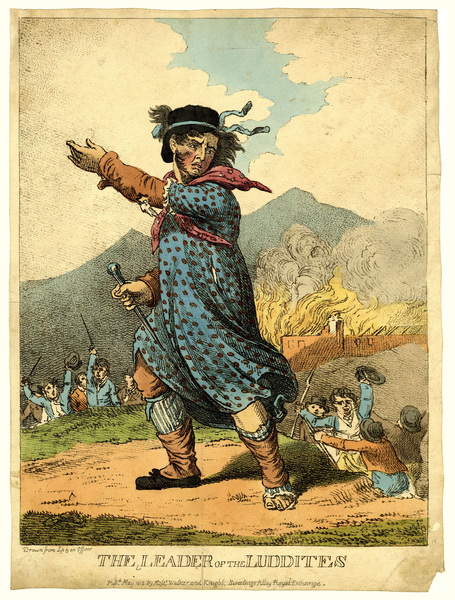
It's time to talk about the Ludding times. That's how they talked about it, those who were there, when readying themselves for an insurrection a few years later. The Ludding times of 1811 to 1816, when communities in Nottinghamshire, Lancashire and the West Riding of Yorkshire rose up against the machines. The Ludding times, with all their similarities to our own times. What can we learn from the Luddites? What can we learn from the heft of a hammer and the idea that, as a later revolutionary said, the urge to destroy is also a creative urge?

To start with, the machines the Luddites were breaking weren't new then, any more that AI is new now, as has been so thoroughly explored in this seminar series on the histories of AI. So what triggered the machine breaking? One catalyst was the condition of the time. Then, like now, England was a country mired in debt, suffering years of hardship, as we've had years of austerity. Then, as now, there was the top-down imposition of new conditions of production that massively increased precarity, thanks to the factories and mills that gathered together machinery in arrangements of steam- or water-powered automation.
The Luddites faced assemblages of machinery that undermined not just artisanship but agency and dignity, ways of life protected by both guilds and common custom, machinic arrangements that sheared and cropped not just cloth but the conditions of social reproduction, radically altering the relations of power under the guise of modernisation. This is a pattern we can see being repeated in front of our eyes. The Luddites speak directly to the need to interrupt AI and to apply community-led constraints to its social violence.

The Luddites had looked to the law to protect them but had been let down. Their petitions had failed and statutory protections were repealed, while food prices spiked and their trade was undermined. In the here-and-now we're being distracted by regulatory theatre: although the GDPR is dead in the water, we're waiting for the penny to drop that the law isn't there to protect us, but to protect property interests. The law can't correct for algorithmic injustice resulting from structural inequality, because the law itself sustains those inequalities. It’s not that law will fail to regulate the harmful effects of AI, but rather that AI is already exposing the comprehensive failure of the law to address real injustice.
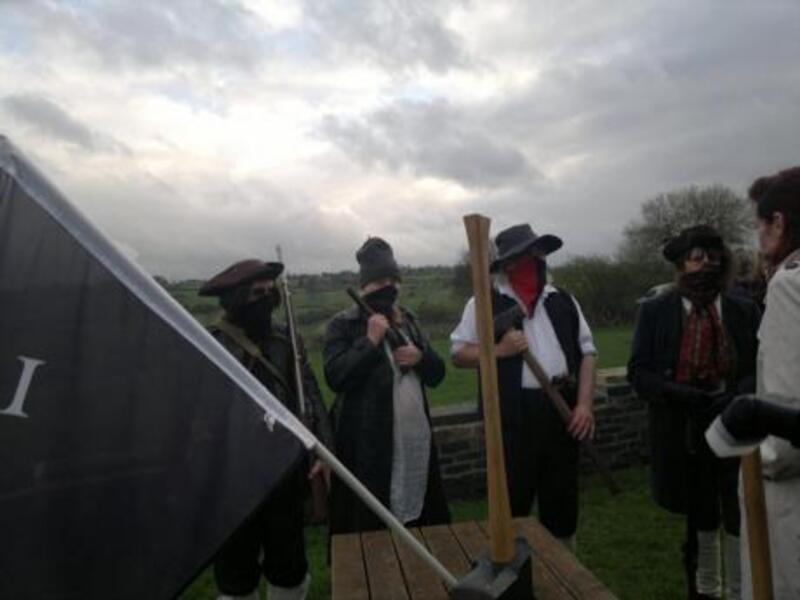
The Luddites' reward for challenging the subservience of law to economic interests was the imposition of states of exception: the Combination Act of 1799 had already made trade unionism illegal and Luddism was followed by the notorious Six Acts incuding the Seditious Meetings Act. Meanwhile, we have the Police, Crime, Sentencing and Courts Bill 2021 and the emergence of algorithmic states of exception. Indeed, basing substantive allocation or determination on AI's correlations not on causality could be said to be a statistical suspension of habeus corpus.
What the Luddites were resisting was not simply automation, but their own reduction and automatisation. From, a General Meeting of Plain Silk Framework-knitters, held at the Fox and Owl Inn, Derby, December 9th, 1811: "We are at a loss to know where to fix the stigma (too much blame being due to ourselves for not watching better over the trade) as each striving to manufacture on the lowest terms, makes us little better than mere engines to support a jealous competition in the market".
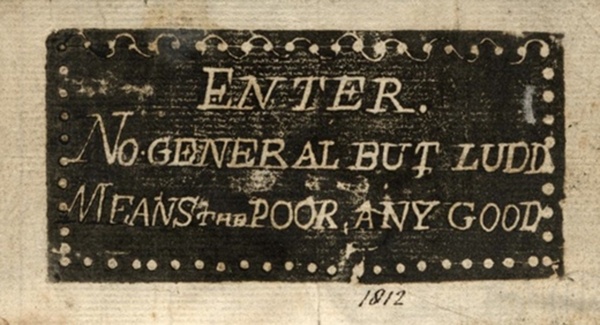
In Luddite times there was still a 'moral economy' that restrained capital accumulation. One manifestation was so-called food riots, where crowds seized grain but in order to sell it at what they deemed a fair price. The Luddites transformed the moral economy into a political struggle. As one letter says "But we. We petition no more - that won't do - fighting must". Their stance was well expressed in a letter to 'M. Smith, Shearing Frame Holder at Hill End Yorkshire', signed by Ned Ludd, clerk to the General Army of the Redressers, which annouced their intention to "put down all Machinery hurtful to Commonality". During the first might of attacks in Huddersfield, on the night of 22nd february 1812, armed with a few pistols, wielding hammers, a masked group of about 45 smashed 8 shearing frames at two separate workshops. At later dates they assembled in hundreds to mount attacks on the mills, some of which were burned down.
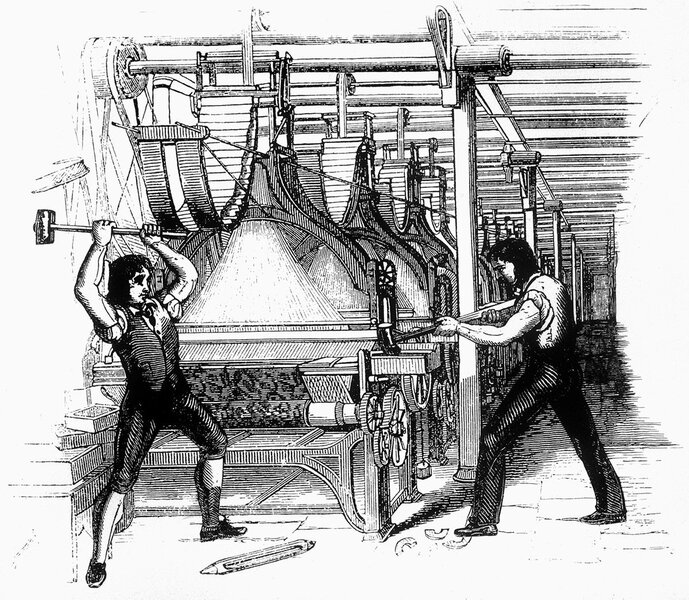
As the song General Ludd’s Triumph says:
"And when in the work of destruction employed
He himself to no method confines
By fire, and by water he gets them destroyed
For the Elements aid his designs
Whether guarded by Soldiers along the Highway
Or closely secured in the room
He shivers them up both by night and by day
And nothing can soften their doom"
The Luddites fight wasn't simply defensive: there was an alternative social vision afoot, fuelled by the French revolution. The political atmosphere before, during and after Luddism was filled with strands of republicanism, from the Jacobins to Peterloo. The Luddites were suppressed with the help of several notorious spies, while in our time Amazon hires the infamous Pinkerton Detective Agency to surveil warehouse workers suspected of union sympathies. The Luddite struggle took place before the rigid separation of society into sites of production and sites of consumption. Its defeat, however, was followed by the ascendence of factory labour.

Only 20 years after the Luddite uprising Charles Babbage, of Analytical and Difference Engine fame, published On the Economy of Machinery and Manufactures. He saw continuity between calculating machines and factories, in that they were both based on division and analytical regulation. What stretches from Babbage to the applied AI of Amazon is not just the history of computing, but a committed anti-workerism. Babbage wrote that “One great advantage which we derive from machinery is the check which it affords against the inattention, idleness or the dishonesty of human agents”.
In the 1960s Tronti and other autonomists proposed the analytic of the social factory, such that all of life has been subsumed into capitalist relations of production. Now AI brings us the algorithmic factory, where all of life is enrolled in machinic optimisation. So if there are so many similarities between Ludding times and ours, and if systems of socially-applied AI are, to use one of the Luddites' favourite terms, obnoxious machines, who are the Luddites now? Is it Hong Kong protestors who cut down smart lampposts running AI facial recognition? Is it Amazon workers at the warehouse outside Paris who cut the power for 8 hours? Is it A-level students shouting 'fuck the algorithm', or the residents and parents in Chandler, Arizona, who blockaded Waymo’s self-driving vans as they were using the town for training, and in at least one case threw rocks at them. "They didn't ask us if we wanted to be part of their beta test" said a mother who’s child was nearly hit by one of the vans.

The example of the Luddites reframes the question of property damage. Luddism was a reaction to economic violence imposed on the weaving communities. AI brings us epistemic violence, a way of knowing that supersedes lived experience, at least, the lived experience of the minoritised and marginalised. AI powers statistical segregation that becomes administrative violence. AI offers the violence of solutionism that subsumes the systemic sources of injustice, while the AI driven triage of welfare scales the structural violence of the state. Who, then, is to say that the time for machine breaking ever went away?
Luddism shows us what is positive in refusal, which isn't simply negation. As abolitionist Ruth Wilson Gilmore says: "prison abolition is not just about closing prisons its a theory of change". Calling for the complete abolition of AI will be derided in the same way as Luddism and prison abolition, but abolishing AI is part of striving for a better world in the here and now. Certainly Luddism is a figure for the militancy that's absent from tech critique, but the lessons we can draw are not only about hammers but about the strength of the community that wielded them.
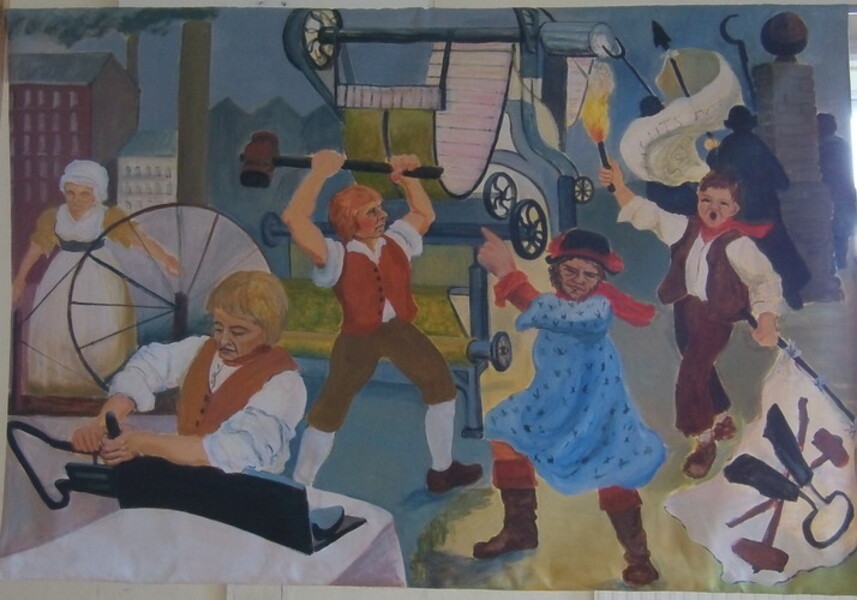
The strength of Luddite resistance took more troops stationed in the north of England to suppress it, than Wellington took at the same time into the iberian peninsula to fight Napoleon. That strength came from solidarity. Solidarity is an action-oriented commitment to one another based on the recognition of a shared commonality. Solidarity is the starting point for a movement to transcend AI, a relationality that comes prior to any system of social, legal or algorithmic classification. The fundamental role of mutual aid cannot be parsed as an optimisation problem. There are collective choices to be made about the kind of futures we want, not just the ones we're statistically predicted to have. Choosing solidarity is to stand against social hierarchy and its algorithmic naturalisation.
The Luddites weren't just self-organised, they were a constituent power, asserting their own right to define the governance of their trade and in the end, of their communities. Organisation between areas was based on delegates from local committees. In Huddersfield, the post-Luddite insurrectionists of 1820 had plans to set-up self-government. Machine breaking was the wildcat action of its time, and the West Riding was the Rojava of its day.

Tech worker protests since Trump, especially those in the giant AI corporations where workers can see their creations being used for immiseration, and worse, are an opening for constituent self-organisation. The workers council: a form that connects us back to the Luddites through the Chartism of the 1840s to the Argentinian crisis of 2001. The council is a decision-making assembly, federating from the bottom up, whose task is to forge, through struggle, a new hammer. As the Luddites would say: “Enoch made them, and Enoch shall break them.”
The struggle is everywhere across the algorithmic factory. Autonomous interventions come through people's councils: those who are affected by AI, who come together as a body to decide what to do about it. People’s councils are horizontal assemblies that prefigure an end to exclusion and exception. As with the Luddites, people's councils are a nomadic tactic: it's for participants to decide where best to intervene in the iterative sedimentation of power. AI's exclusions are always at the same time enclosures, while commoning is the action of taking aspects of the world back into the collectively governed commons. The task for people's councils is not only to disrupt the apparatus of AI, but to invert the state of exception, to reclaim those spaces for the commons, and to occupy those spaces with autonomous activity.

The Luddites struck while machine looms and mills
were still being established.
Algorithmic force is already undermining due process and social solidarity,
but all is not yet lost:
the very generalisability of AI
drives the kind of intersectionality
that catalyses the contestation
of the totality of social relations.
The roots, perhaps, of a militant alternative
to the necropolitics of neural networks.
Efficiency through segregation and optimisation
is the language of supremacy.
AI bears this mark
from its mathematical pre-origins in the pursuit of eugenics.
The role of the modern Luddite
is to 'no platform' the platform economy.
As was said in a threatening letter sent to the Reverend W. Blacow in 1812,
in response a sermon where he had denounced the Luddites,
signed by a 'Lt of the Luddites':
"I will overturn, overturn, overturn".
Dan McQuillan 23rd June 2021